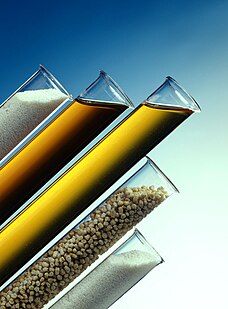
Back مضاف غذائي Arabic Qida əlavələri Azerbaijani Аҙыҡ өҫтәмәләре Bashkir Харчовыя дабаўкі Byelorussian Харчовы дадатак BE-X-OLD Хранителна добавка Bulgarian Prehrambeni aditivi BS Additiu alimentari Catalan Potravinářská přídatná látka Czech Tilsætningsstof Danish

Food additives are substances added to food to preserve flavor or enhance taste, appearance, or other sensory qualities. Some additives, such as vinegar (pickling), salt (salting), smoke (smoking) and sugar (crystallization), have been used for centuries to preserve food. This allows for longer-lasting foods, such as bacon, sweets or wines.
With the advent of ultra-processed foods in the late 20th century, many additives having both natural and artificial origin were introduced. Food additives also include substances that may be introduced to food indirectly (called "indirect additives") in the manufacturing process through packaging, storage or transport.[1]
In Europe and internationally, many additives are designated with E numbers, while in the United States, additives in amounts deemed safe for human consumption are designated as GRAS.